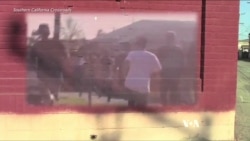Writing a song, painting a picture or acting on stage is not only fun but can also be therapeutic for a person who is coping with a painful past. In southern Los Angeles, a nonprofit organization is helping troubled teens heal through filmmaking.
Teenagers running down the street and then violently attacking a person - this is a scene from student filmmaker Fernando Lopez’s first movie, and it's something he has seen before.
“Filmmaking is the perfect outlet for me to release all my emotions, whether it’s in writing, acting or directing," Lopez said. "And I get to share a little bit of myself."
The 17-year-old starred in and directed a film called "Our First Movie." It is a tale of two aspiring filmmakers who clash over turf and stolen camera equipment.
“By the end of the day, we end up seeing how we’re not so different after all. We both have a story to tell,” Lopez said.
Lopez’s story is partly inspired by his mother’s time in jail, which left him withdrawn and defensive, like his co-star in the movie.
But two years ago, he joined Southern California Crossroads, a nonprofit organization that helps youth in violent communities gain skills and find career paths. Filmmaking is one of its many programs.
Telling stories, gaining strength
The students use their personal stories to create fictional movies addressing real-life scenarios and helping them cope with the past. Their films are shown at public schools throughout south Los Angeles to bring healing to the larger community.
“It’s an eye-opening experience because we get to see a side of each other that we never really have," Lopez said. "Because the topics we deal with are very personal. You see how that, like, plays into our own lives and how we relate to it."
Drama therapist Mimi Savage said the arts are therapeutic, though revisiting past emotions can be dangerous without professional guidance.
“For instance, when working with youth or working with people with mental illness," Savage said therapists must consider "where they are, where they are developmentally, for instance, so that we don’t re-traumatize them or so what they want to express doesn’t put them back into that place of pain or trauma."
Student films have tackled bullying, gangs, domestic violence, suicide, homelessness and friendship.
Southern California Crossroads' executive director, Paul Carrillo, said teens from his old neighborhood need the program.
“I can name a few dozen individuals who I grew up with and if there was a program like this, they probably wouldn’t be dead or in jail right now,” he said.





